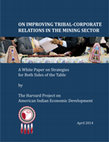Papers by Anthony McInnis
On improving tribal-corporate relations in the mining sector: a white paper on strategies for both sides of the table
Wastewater Treatment Integrated with Algae Production for Biofuel
The Science of Algal Fuels, 2012

Harvard Project on American Indian Economic Development, Ali, S. H., Jorgensen, M., Kalt, J. P., Krakoff, S., McInnis, A., . . . Youpee-Roll, A. (2014). ON IMPROVING TRIBAL-CORPORATE RELATIONS IN THE MINING SECTOR: A White Paper on Strategies for Both Sides of the Table. Mining everywhere is inherently controversial. By its very nature, it poses hard
economic, envi... more Mining everywhere is inherently controversial. By its very nature, it poses hard
economic, environmental, and social tradeoffs. Mining that affects indigenous
communities -- because they own or govern targeted minerals or because they are
culturally, economically and/or environmentally affected by the development of targeted
minerals -- is especially controversial. Indigenous people have borne a long history of
exploitation of their resources without their consent and to their detriment. But times are
changing. The U.S. tribes increasingly have the legal and institutional capacity to assert
rights of local self-government that can make or break a mining project.
The guiding presumptions of this study are that: (i) as federally-recognized
sovereigns within the United States’ federalist system, the U.S. American Indian tribes
have the right and the obligation to their citizens to determine whether they will
undertake development of the minerals they govern and, if so, with whom; and (ii) tribes
and the mining companies they deal with each have the concomitant right to choose
whether, when and where they will engage with each other. It follows that it is in tribes’
and mining companies’ interests to each be equipped with the information, tools and
strategies they need to make informed decisions as to whether they should work with
each other and, if so, how to strike the long-lived relationships that mining entails so as to
sustain those relationships because they yield net benefits to each party. This report is
intended to add to the information, tools and strategies that serve these ends.
The tribal context is unique. The regulatory gauntlets that projects on or near
Indian lands must get through form an overlapping, sometimes inconsistent, morass.
Moreover, they create structures that enhance the ability of third-party players, from
environmental groups to the press, to affect the course and outcome of project initiation
and operation. If tribes are to exercise their sovereign rights to say yes or no based on the
values and needs of their own citizens, and if they are to realize sustained benefits when
they do say yes to mining (or any large land-using project), they must arm themselves
with specialized legal, regulatory, administrative, technical and commercial capacities.
For their part, developers of tribal resources must “thicken” their corporate
institutional capacities with specific knowledge, structures and strategies which recognize
that the setting of sovereign and increasingly sophisticated tribes is different from their
experiences elsewhere, and that they have little choice but to respect and deal responsibly
with the governing powers of the tribes. While tribal governments can be relatively
inexperienced, more than one would-be developer has found out the hard way that tribes’
governments are real, with the power to make or break otherwise attractive projects.










Uploads
Papers by Anthony McInnis
economic, environmental, and social tradeoffs. Mining that affects indigenous
communities -- because they own or govern targeted minerals or because they are
culturally, economically and/or environmentally affected by the development of targeted
minerals -- is especially controversial. Indigenous people have borne a long history of
exploitation of their resources without their consent and to their detriment. But times are
changing. The U.S. tribes increasingly have the legal and institutional capacity to assert
rights of local self-government that can make or break a mining project.
The guiding presumptions of this study are that: (i) as federally-recognized
sovereigns within the United States’ federalist system, the U.S. American Indian tribes
have the right and the obligation to their citizens to determine whether they will
undertake development of the minerals they govern and, if so, with whom; and (ii) tribes
and the mining companies they deal with each have the concomitant right to choose
whether, when and where they will engage with each other. It follows that it is in tribes’
and mining companies’ interests to each be equipped with the information, tools and
strategies they need to make informed decisions as to whether they should work with
each other and, if so, how to strike the long-lived relationships that mining entails so as to
sustain those relationships because they yield net benefits to each party. This report is
intended to add to the information, tools and strategies that serve these ends.
The tribal context is unique. The regulatory gauntlets that projects on or near
Indian lands must get through form an overlapping, sometimes inconsistent, morass.
Moreover, they create structures that enhance the ability of third-party players, from
environmental groups to the press, to affect the course and outcome of project initiation
and operation. If tribes are to exercise their sovereign rights to say yes or no based on the
values and needs of their own citizens, and if they are to realize sustained benefits when
they do say yes to mining (or any large land-using project), they must arm themselves
with specialized legal, regulatory, administrative, technical and commercial capacities.
For their part, developers of tribal resources must “thicken” their corporate
institutional capacities with specific knowledge, structures and strategies which recognize
that the setting of sovereign and increasingly sophisticated tribes is different from their
experiences elsewhere, and that they have little choice but to respect and deal responsibly
with the governing powers of the tribes. While tribal governments can be relatively
inexperienced, more than one would-be developer has found out the hard way that tribes’
governments are real, with the power to make or break otherwise attractive projects.
economic, environmental, and social tradeoffs. Mining that affects indigenous
communities -- because they own or govern targeted minerals or because they are
culturally, economically and/or environmentally affected by the development of targeted
minerals -- is especially controversial. Indigenous people have borne a long history of
exploitation of their resources without their consent and to their detriment. But times are
changing. The U.S. tribes increasingly have the legal and institutional capacity to assert
rights of local self-government that can make or break a mining project.
The guiding presumptions of this study are that: (i) as federally-recognized
sovereigns within the United States’ federalist system, the U.S. American Indian tribes
have the right and the obligation to their citizens to determine whether they will
undertake development of the minerals they govern and, if so, with whom; and (ii) tribes
and the mining companies they deal with each have the concomitant right to choose
whether, when and where they will engage with each other. It follows that it is in tribes’
and mining companies’ interests to each be equipped with the information, tools and
strategies they need to make informed decisions as to whether they should work with
each other and, if so, how to strike the long-lived relationships that mining entails so as to
sustain those relationships because they yield net benefits to each party. This report is
intended to add to the information, tools and strategies that serve these ends.
The tribal context is unique. The regulatory gauntlets that projects on or near
Indian lands must get through form an overlapping, sometimes inconsistent, morass.
Moreover, they create structures that enhance the ability of third-party players, from
environmental groups to the press, to affect the course and outcome of project initiation
and operation. If tribes are to exercise their sovereign rights to say yes or no based on the
values and needs of their own citizens, and if they are to realize sustained benefits when
they do say yes to mining (or any large land-using project), they must arm themselves
with specialized legal, regulatory, administrative, technical and commercial capacities.
For their part, developers of tribal resources must “thicken” their corporate
institutional capacities with specific knowledge, structures and strategies which recognize
that the setting of sovereign and increasingly sophisticated tribes is different from their
experiences elsewhere, and that they have little choice but to respect and deal responsibly
with the governing powers of the tribes. While tribal governments can be relatively
inexperienced, more than one would-be developer has found out the hard way that tribes’
governments are real, with the power to make or break otherwise attractive projects.